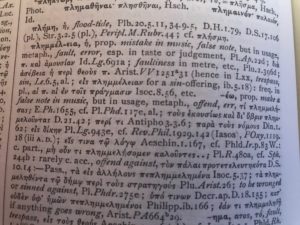There is an interesting word for “sin” found in the Greek translation of the Old Testament, used over 62 times, that never made it into the Gospels or the Epistles of the New. And even if the Hebrew has no equivalent term, the concept it embodies is, nonetheless, very Jewish. The question to ask is not “What was my sin” as if a single misstep or a single act of indiscretion needs forgiveness. The question with this Old Testament Greek word is not “what” but “where.”
Where did I go wrong?
In the New Testament we see sin either as the expression of fallen nature (sinfulness) or we reference our individual misdeeds, misplaced passions, and abusive words; but in the Old Testament—and this is, as I said, very Jewish—sin means being out of harmony with nature. I found a relevant Einstein quote, Even though he was known to be an atheist, he didn’t denigrate believers.: Douglas Leblanc said, “He heard the music of the spheres.”
 ‘What separates me from most so-called atheists is a feeling of utter humility toward the unattainable secrets of the harmony of the cosmos.’
‘What separates me from most so-called atheists is a feeling of utter humility toward the unattainable secrets of the harmony of the cosmos.’
To sin, to use a Classic Greek metaphor, is to be “out of tune.” When we are as we should be, as God ordained, we are making music. But when a false note is hit, when we “sin,” the discordant sound causes all nature to jump in offense The Ancient Greeks would say, “He made a false note!” A false note is another way of saying “a mistake or error” in judgment was made.
All sin is out of tune, out of harmony, first and foremost, with our relationship with God, then each other, and finally with our own person, our own dreams, desires, and happiness—with our own world.
The Hebrew Bible meets us with a full acknowledgement of these manifold aspects of human suffering, and blends wrong doing and suffering to a remarkable degree, setting forth sin in its relation to God, to society, and to a man’s own self. [Robert Girdlestone. Synonyms of the Old Testament (Grand Rapids, MI: Grand Rapids Book Manufacturers, Inc. 1974), 76 ]
Moses hinted at this idea when he cautioned God’s people about carefully following God’s precepts, , “Listen, Israel, and be careful to follow them, so that you may prosper...” [Deuteronomy 6:3] It is a loving Creator who knows the science behind proper living that encouraged Ancient Israel to follow the rules—follow the laws that kept them in harmony  with His world. Wish they had!!!
with His world. Wish they had!!!
The Greek for Psalm 34:22, which is in the Septuagint Psalms 33:22 is encouraging, “those who hope in Him shall not go wrong” [οὐ μὴ πλημμελήσωσιν πάντες οἱ ἐλπίζοντες ἐπ᾽ αὐτόν].
But let’s not toss the Hebrew to the curb! It reads, “The LORD redeems (will rescue) … His servants, and all who take refuge in Him will not be punished.”
 We “kind-of” get the message that God’s Eden is still on His mind where—before that fatal bite—all was in harmony…..
We “kind-of” get the message that God’s Eden is still on His mind where—before that fatal bite—all was in harmony…..
What a beautiful description of heaven, the place of total, absolute, and eternal harmony…..


